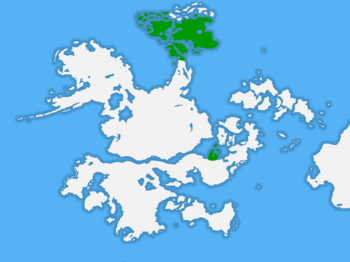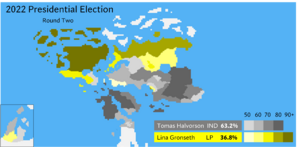Charville: Difference between revisions
No edit summary |
No edit summary |
||
| Line 21: | Line 21: | ||
|other_symbol_type = <!--Use if a further symbol exists, e.g. hymn--> | |other_symbol_type = <!--Use if a further symbol exists, e.g. hymn--> | ||
|other_symbol = | |other_symbol = | ||
|image_map = | |image_map = Charville_in_Laurentia.png | ||
|loctext = <!--text description of location of country--> | |loctext = <!--text description of location of country--> | ||
|alt_map = <!--alt text for map--> | |alt_map = <!--alt text for map--> | ||
Revision as of 18:38, 26 May 2022
Charvillean Republic Charvilansk Republikk (Oanthanian) Karvvilik a-ty Saaoki (Distani) ᐅᖃᓕᒫᕐᓂᖅ ᑎᑎᖅᑲᒃᑯᕕᒃ (New Highlandic) Republică Charvilleană (Fendiralian) | |
|---|---|
| Motto: Kulde favoriseren de frykteminr "The cold favours the fearless" | |
 | |
| Capital and largest city | Aenva |
| Official languages | Oanthanian Distani New Highlandic Fendiralian |
| Ethnic groups (2024 census) | 67% Charvillean —49% Oanthanian —8% Distani —5% Indigenous, including Highlanders and Dietten First Nations —5% Other 22% Fendiralian 11% non-Charvillean |
| Government | Federal parliamentary republic |
• President | Tomas Halvorson |
• Prime Minister | Frances Øksendal |
| Legislature | Parliament |
| Forsemling | |
| Rådmennget | |
| Establishment | |
• Unification of Oanthan and Distan | August 3, 1702 |
• Monarchy abolished | December 26, 1922 |
• Constitution | August 3, 1923 |
| Area | |
• Total | 1,864,067 km2 (719,720 sq mi) |
• Water (%) | 3.06 |
• Total land | 1,807,016 km2 (697,693 sq mi) |
| Population | |
• 2025 estimate | Q2 11,851,000 |
• 2024 census | 11,780,245 |
• Density | 6.4/km2 (16.6/sq mi) |
| GDP (PPP) | 2025 estimate |
• Total | R523 Billion |
• Per capita | R44,131 |
| GDP (nominal) | 2025 estimate |
• Total | R384 Billion |
• Per capita | R32,402 |
| Gini (2024) | 36.8 medium |
| HDI (2024) | very high |
| Currency | Rova (RVA) |
| Time zone | UTC-8 (Provincial Time)
UCT-7 (Dietten Time) UCT+1 (CFT Time) |
| Date format | dd/mm/yyyy |
| Driving side | right |
| Calling code | +85 |
| Internet TLD | .cv |
The Charvillean Republic, commonly known as Charville, is a sovereign country located in the north-west of Laurentia, in the Arctic regions of the continent. Charville includes the islands of Haathal in the east, Tuukitkia in the north-west, Malidi in the south and many smaller islands. The south-eastern of the Charvillean province of Malidae shares a border with mainland Laurentia. Charville is surrounded by the Arctic Ocean, with the Ikkanese Sea to the west and Haathal Bay to the south-west. The Strait of Charville separates the islands of Haathal and Zytavkia, and runs directly through the centre of the country. The south-eastern of the Charvillean state of Malidae shares a border with Timiskrane, whilst the CFT borders both Fendiralia and the Fleet of Oceans. There is a border with Daraln in Charville's Dietten Territory. The total area of Charville is 1,049,479 sq km (652,115.75 sq mi), with a population at the 2024 census of 11,780,245. Charville is a federal parliamentary republic. The office of the head of the state, the President, is currently held by Tomas Halvorson. Charville’s capital and largest city is Aenva, a historic city with an urban area population of more than 2 million and the country's economic and political capital. Other large cities include Dăbucuta, Ekonsas and Malidae City. Charville consists of six provinces: the City of Aenva, Distan, the Highlands, Malidae, North Oanthan and South Oanthan, and two overseas territories: Charvillean Fendiralia and Dietten.
Written history in what is now Charville began in 825 with the first arrival of Nordesian settlers on Haathal Island, although humans had been present in the region for at least a millenium prior, in the form of the indigenous nations of Distan, the Malideen Empire and several tribes on Tuukitkia Island to the west. Oanthan—the newly established Nordesian nation—had completely occupied Malideen territory by the 12th century, and would continue to grow in population, developing a bitter rivalry with Distan to the north. The two states lived in widespread poverty and relative isolation from the rest of Telrova until the early 16th century, when advancements in seafaring began an era of trade and economic growth for Oanthan in particular. Distan, on the other hand, was plagued throughout the 1600s with widespread poverty and civil unrest, prompting the Distani nobility to seek a unification with Oanthan. In 1702, the two nations united to form Charville, governed by a diarchy until the Oanthanian and Distani dynasties married into one another in the latter half of the century. However, by 1919, the monarchy had fallen out of favour with the Charvillean people, sparking a civil war that would end in 1922 with a Republican victory, leading to Charville adopting a President and holding its first election in history. Distan, unhappy at the seemingly Oanthanian-centric government, acheived independence briefly between 1960-5, during at which time a Nordesian supremascist group The Uprising took over the nation in a coup, only toppled after a long and bloody Charvillean military intervention—this would later be known as the Second Civil War. The 1970s and 80s saw an economic and cultural boom for Charville, only halted in recent years by a number of recessions and a week-long attempted invasion by Rex Omnia.
Charville has a high-income economy and a very high human development index rating. The country is known for its large finance industry and high amounts of economic freedom, and perfoms well in rankings of healthcare and education. The nation, however, has been plagued with an increase of terrorism in recent years, mainly through extremist group the Third Uprising. Charville is a member of the United Federation of Telrova, the Group of Nations and the Nordesian Union.
Etymology
The name of Charville derives from a word in the long-extinct Malideen language meaning 'two states': 'carvelli'. In a conference in 1698 that would begin the gradual unification of the nations of Oanthan and Distani, Oanthani minister Ulf Kaareson recalled the word from a history lecture several years prior, vocalising it as it would be pronounced in Oanthani: 'Charville'. The name stuck, and was used as a placeholder for the future country in the period leading up to the 1702 unification, and eventually for the country itself. Citizens of Charville are known as 'Charvilleans' but are sometimes informally called 'Chars'.


